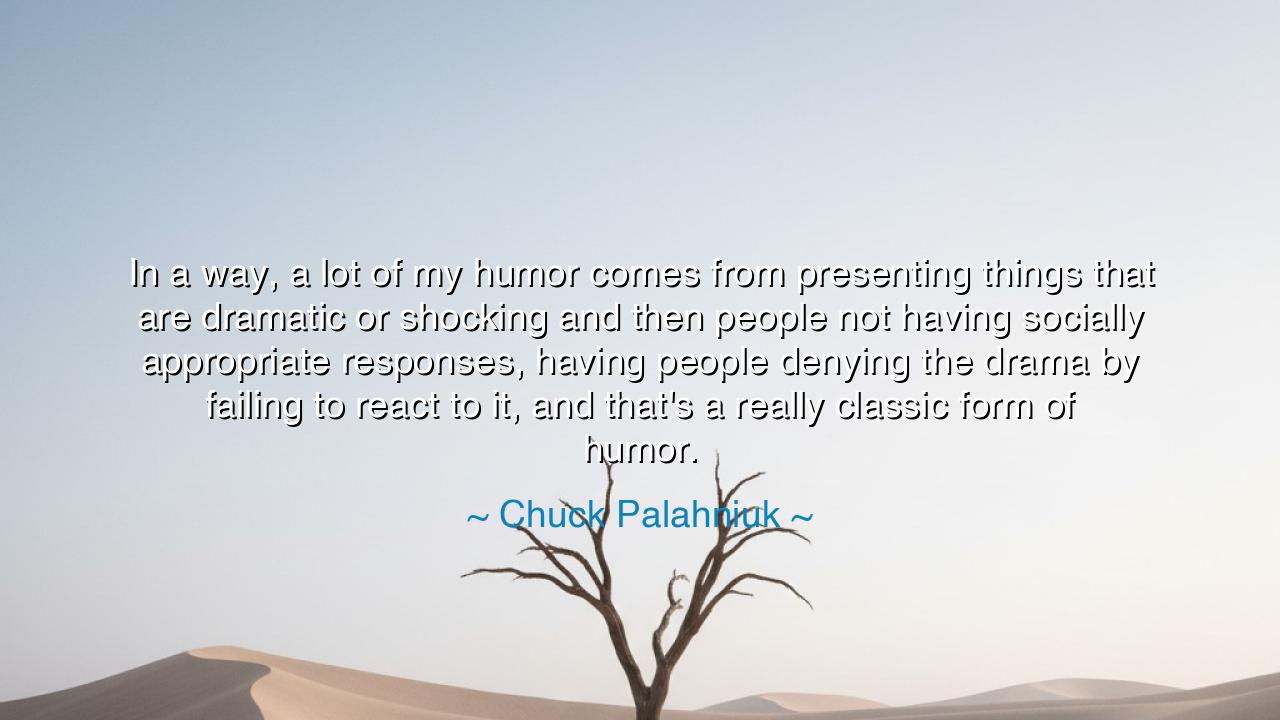
In a way, a lot of my humor comes from presenting things that are
In a way, a lot of my humor comes from presenting things that are dramatic or shocking and then people not having socially appropriate responses, having people denying the drama by failing to react to it, and that's a really classic form of humor.






Hear the words of Chuck Palahniuk, the dark chronicler of modern man’s soul: “In a way, a lot of my humor comes from presenting things that are dramatic or shocking, and then people not having socially appropriate responses, having people denying the drama by failing to react to it, and that’s a really classic form of humor.” In these words lies a truth both unsettling and profound—the understanding that laughter is not always born of joy, but of recognition; that the absurd lies not in the chaos itself, but in our attempt to pretend it does not exist.
The ancients would have called this the laughter of the wise—the laughter that pierces illusion. For Palahniuk, the master of disquiet, finds comedy not in the ordinary, but in the fractures of human behavior. When something dramatic occurs—something violent, grotesque, or sorrowful—and the crowd sits in silence, smiling nervously, shifting uncomfortably, there is truth revealed in that moment. The humor arises from contrast, from dissonance—the collision between what should be felt and what is suppressed. This, he says, is a classic form of humor, and indeed it is as ancient as tragedy itself.
Consider the great Diogenes of Sinope, the mad philosopher who mocked the conventions of his age. He lived in a barrel and carried a lantern through the streets at noon, claiming to search for an honest man. When Alexander the Great stood before him in admiration and offered to grant him any wish, Diogenes simply replied, “Stand out of my sunlight.” The crowd laughed—not because the exchange was frivolous, but because it was shocking truth spoken without fear. Alexander embodied power; Diogenes embodied freedom. In that moment, laughter became revelation—the stripping away of pretense. This is the laughter Palahniuk seeks: the laughter that comes when truth confronts hypocrisy, when the mask of politeness cracks.
Humor, in this form, becomes a mirror to the human condition. It exposes the strange rituals of social life—the way people smile at funerals, joke amid disaster, or speak lightly of pain. Palahniuk’s worlds, filled with fighters, anarchists, and broken souls, echo with such moments. His characters laugh at ruin because society has trained them to fear sincerity more than destruction. When they encounter something horrific, they suppress their instinct to cry and instead joke, fidget, or pretend. And it is there—in the failure to react properly—that dark humor is born. It reminds us that beneath all our manners, we remain creatures of chaos, pretending at civility while our hearts tremble in the dark.
Yet this form of humor is not cruel—it is cathartic. It allows us to face what would otherwise destroy us. When the heart cannot bear the weight of sorrow, it laughs. When the mind cannot process terror, it mocks. This laughter is the soul’s rebellion against despair. The ancients knew it as the laughter of the tragic hero, the smile that greets death not out of madness, but out of wisdom. For to laugh at the abyss is to declare, “You cannot consume me.” Palahniuk’s humor, like that of the Stoics and jesters before him, is an act of survival.
There is a lesson here for all who live in an age of noise and numbness. We have become a society of masks—trained to smile when we are broken, to scroll when we should grieve, to perform when we should feel. The inappropriate laughter, the awkward silence, the deflected emotion—all are symptoms of our fear of honesty. To understand Palahniuk’s words is to see that humor can be a form of truth-telling. It unmasks the absurdity of a culture that prizes appearances over authenticity. It reminds us that denying pain does not erase it—it only makes us strangers to ourselves.
So, let the listener take this wisdom to heart: do not fear discomfort, for it is the doorway to insight. Laugh, but laugh knowingly. When you encounter something shocking, do not hide behind empty laughter or false composure. Let your response be human, not rehearsed. Learn to see humor not as escape, but as revelation. For when you can look upon the darkness and find within it the light of understanding, you become free. And in that freedom, your laughter—like that of Palahniuk’s—will no longer be the sound of denial, but the music of awakening.






AAdministratorAdministrator
Welcome, honored guests. Please leave a comment, we will respond soon